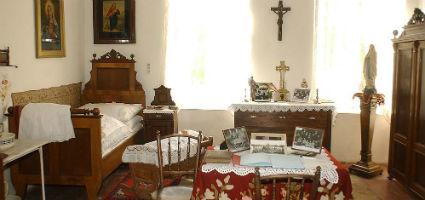2025. July 11. Friday
Leimen House - Elek
 |
Address: 5742, Elek Kétegyházi út 2.
Phone number: (66) 240-189
|
The village of Elek had been populated before the Original Settlement. The first document it was mentioned in dated in 1232. During Ottoman Hungary, the village was depopulated. After the Ottoman left, just as it happened to a number of other habitats, Elek was methodically repopulated. In 1724, János György Harruckern invited Germans to settle in the village. By 1854 Elek became a market town. When the legal term was out of use at the end of the 19th century, Elek was renamed municipality. In consequence of the Treaty of Trianon, the village of Elek found itself near the new borders and so lost most of its commercial partners. Between 1920 and 1923, it was the seat of Arad County (then Comitatus).
After WWII, German speaking people were either transported from the town to do forced labour, or were interned to Germany. To replace them, new settlers arrived. The internment in Elek was among the worst in Hungary. Based on statistics, 5619 people were dragged out of their homes, more than the present day population of Elek.
Ever since 1990, the residents of Elek have organized meetings with the interned families on a regular basis. In 1997, the German Community House was opened in the house once owned by Strifler to cultivate German tradition. The effort was partly financed by German families relocated from Elek. The lifesyle of German speaking people who lived in Elek in the period from 1724 to 1946 is demonstrateed in the community house.
In one of the rooms, the local Swabians are remembered with characteristic furniture. Three manikins, a young girl, a woman and an older women, are dressed in traditional clothing.
The smaller room contains a chesterfield, a washing chest, an iron stove and a sawing machine. There is a Niedermayer prayer book on the table. The gypsum print made in 1924 for the 200 anniversary of Germans settling in Elek is also to be seen in the smaller room.
Elek was ranked town in 1996. Several nationalities live in the town at present: Germans, Slovakians, Romanians and Gypsies.
A set of statues unmatched in Hungary was inaugurated in August 2001 in Elek to commemorate the expulsion of Germans, the event that embittered the life of thousands. The memorial was made by the sculptor Sándor Kligl of Szeged.
After WWII, German speaking people were either transported from the town to do forced labour, or were interned to Germany. To replace them, new settlers arrived. The internment in Elek was among the worst in Hungary. Based on statistics, 5619 people were dragged out of their homes, more than the present day population of Elek.
Ever since 1990, the residents of Elek have organized meetings with the interned families on a regular basis. In 1997, the German Community House was opened in the house once owned by Strifler to cultivate German tradition. The effort was partly financed by German families relocated from Elek. The lifesyle of German speaking people who lived in Elek in the period from 1724 to 1946 is demonstrateed in the community house.
In one of the rooms, the local Swabians are remembered with characteristic furniture. Three manikins, a young girl, a woman and an older women, are dressed in traditional clothing.
The smaller room contains a chesterfield, a washing chest, an iron stove and a sawing machine. There is a Niedermayer prayer book on the table. The gypsum print made in 1924 for the 200 anniversary of Germans settling in Elek is also to be seen in the smaller room.
Elek was ranked town in 1996. Several nationalities live in the town at present: Germans, Slovakians, Romanians and Gypsies.
A set of statues unmatched in Hungary was inaugurated in August 2001 in Elek to commemorate the expulsion of Germans, the event that embittered the life of thousands. The memorial was made by the sculptor Sándor Kligl of Szeged.
Opening hours
Entrance is free of charge
for everybody
Contact
| Address | 5742 Elek, Kétegyházi út 2. |
| Address | Szilbereisz Józsefné, 5742 Elek, Hősök u. 29. |
| Telephone | (66) 240-189
|
| Web |